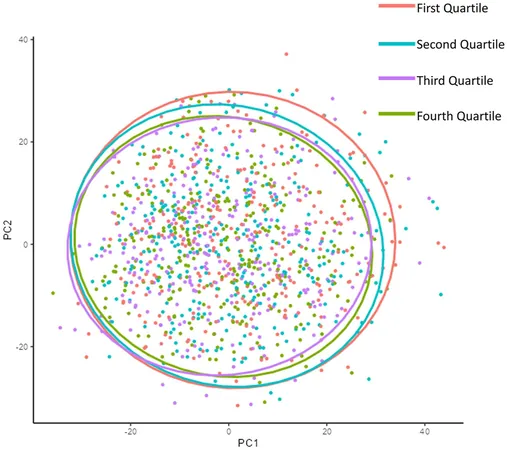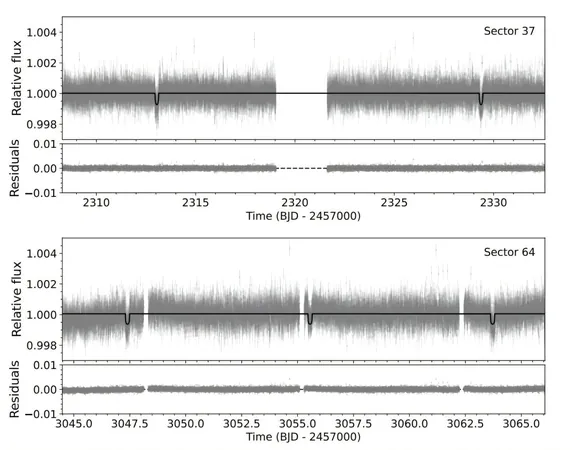
Unlocking the Secrets of Your Smile: How Diet Shapes Your Oral Microbiome
2025-04-14
Author: Jia
A Groundbreaking Study on Diet and Oral Health
In a pioneering study conducted by the University at Buffalo, researchers have revealed intriguing connections between diet quality and the oral microbiome—a first of its kind focusing on postmenopausal women.
Eating Healthy for a Healthier Mouth?
Published in the Journal of Nutrition, the research indicates that women who adhere to healthier dietary habits exhibit a lower abundance of harmful bacteria in their mouths, including *Streptococcus gordonii*, known for promoting gum disease, and *Cardiobacterium species*, associated with heart infections.
Nutritious Choices Make a Difference
The study analyzed the dietary quality of 1,175 postmenopausal women by employing the Healthy Eating Index 2020 (HEI-2020) to assess their eating patterns. This index evaluates adherence to the 2020 Dietary Guidelines for Americans and correlates their scores with changes in oral microbiomes.
While the overall HEI-2020 scores showed a notable association with the composition of the oral microbiome, it was the individual dietary components that revealed more detailed insights. For instance, higher vegetable and protein intakes corresponded to a more diverse oral microbiome, while dairy products and added sugars led to reduced diversity.
A Comprehensive Look at Diet Quality
"Previous research often isolated specific foods or nutrients, but we wanted to capture a broader perspective of how overall diet affects these bacteria," explains Yihua Yue, Ph.D., the study's lead author. Now a postdoctoral fellow at the Cleveland Clinic, Yue emphasizes the interconnected nature of dietary components and their collective impact on health.
Why This Matters for Your Health
Researchers like Amy Millen, Ph.D., associate professor at UB, highlight the significant implications of their findings. She's pointed out that periodontal disease is linked to various chronic health issues, including cancer and cardiovascular diseases. The research aims to identify nutrition as a potential risk factor for periodontal disease by examining how diet quality influences oral bacteria.
Dietary Guidelines in Focus
The HEI-2020 is composed of 13 food components, each contributing to diet quality. While generally beneficial for health, not all individual components influence oral microbial composition uniformly. Yue believes that emphasizing appropriate intakes of sugar, vegetables, seafood, and plant-based proteins could reshape our understanding of oral health.
Shaping Future Nutritional Guidelines
This research not only enriches our knowledge of diet's role in oral health but also aims to provide valuable insights for the U.S. Department of Agriculture to consider how diet influences dental well-being. The results advocate for a closer look at dietary recommendations, pushing the agenda for healthier eating habits that could lead to healthier smiles!



 Brasil (PT)
Brasil (PT)
 Canada (EN)
Canada (EN)
 Chile (ES)
Chile (ES)
 Česko (CS)
Česko (CS)
 대한민국 (KO)
대한민국 (KO)
 España (ES)
España (ES)
 France (FR)
France (FR)
 Hong Kong (EN)
Hong Kong (EN)
 Italia (IT)
Italia (IT)
 日本 (JA)
日本 (JA)
 Magyarország (HU)
Magyarország (HU)
 Norge (NO)
Norge (NO)
 Polska (PL)
Polska (PL)
 Schweiz (DE)
Schweiz (DE)
 Singapore (EN)
Singapore (EN)
 Sverige (SV)
Sverige (SV)
 Suomi (FI)
Suomi (FI)
 Türkiye (TR)
Türkiye (TR)
 الإمارات العربية المتحدة (AR)
الإمارات العربية المتحدة (AR)